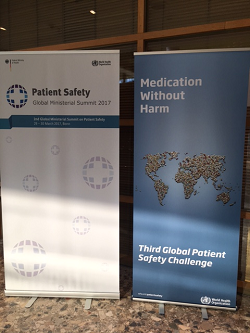WHO has successfully led two global patient safety challenges in the past, hand hygiene and surgical safety checklist. At the side-event of the 69th World Health Assembly, the next global initiative was planned with improving medication safety. With the focus on medication safety in high-risk situations, polypharmacy and transitions of care, the Third Global Patient Safety Challenge Medication Without Harm was formally announced at the 2nd Global Ministerial Patient Safety Summit at Bonn, Germany. The overall goal of the Challenge is to reduce severe, avoidable medication-related harm by 50% over the next 5 years. Many participating countries confirmed that they will be participating in the challenge.
The launch session was chaired by WHO Patient Safety Envoy Sir Liam Donaldson and co-chaired by WHO Patient Safety and Quality Department’s Coordinator Dr. Neelam Dhingra-Kumar. Prof. Phillip Routledge from the All Wales Therapeutics & Toxicology Centre spoke about the need to focus on the people, the external environment and the medications when addressing the high-risk medications. He highlighted the seven aspects of prescription safety as well as the need to have formal assessment of safe prescribing habits as done by the British Pharmacological Society and UK Medical Schools Council. Similarly, a renewed focus on high risk medications (A-PINCH) – Anti-Infectives, Potassium, Insulins, Narcotics, Chemotherapeutic agents and Heparins & Anticoagulants, should be initiated by standardizing many of the processes of medication prescription, dispensing, administration and consumption.

Alpana Mair, Head of Prescribing & Therapeutics of the Scottish Government talked about the increasing polypharmacy associated with multi-comorbidities of the aging population. She spoke about the need to assess the patient and reduce unnecessary medications by following the National Polypharmacy Programme, a multidisciplinary evaluation. Another initiative that is being trialed at 10 organizations across Europe is the Stimulating Innovation Management of Polypharmacy and Adherence in the Elderly (SIMPATHY) that is joining clinicians and policy makers to adopt and share innovative best practices.
Allen Vaida from Institute for Safe Medication Practices (ISMP) presented the key causes of medication errors and strategies for improvement. He emphasized the need for comprehensive medication history, reducing polypharmacy as well as engaging patients. He showed numerous examples of similar sounding (look-alike and sound-alike) medications with confusing labels. ISMP has helped guide many regulatory changes across the world by implementing improvement strategies with the involvement of regulatory authorities, government, and industry.
Priyadarshani Gallapatthy from Sri Lanka discussed the global burden of unsafe medical care and the lack of systems to promote medication safety, particularly in low- and middle-income countries (LMICs). The majority of safety related work is done via the WHO’s global pharmacovigilance network. Illegible prescriptions, lack of standardizations, counterfeit medicines, under-developed reporting and learning systems along with a severe lack of trained clinical pharmacists are some of the major issues faced by providers in LMICs.
Maryann Murray, a patient advocate from Patients for Patient Safety Canada shared a heartbreaking experience about how her daughter succumbed to a medication error because of a system failure. She emphasized the need to understand that there is a human behind every medication consumption and engaging them is one of the most important things health care systems can do. She also encouraged providers and systems to acknowledge the errors and learn from them to improve the system.
Neelam Dhingra spoke about the WHO’s Action Plan of the Third Global Patient Safety Challenge. She focused on the need to provide Global Leadership, policies and strategies and facilitate sharing of best practices. She highlighted the need to update and implement medication safety curriculum in undergraduate and postgraduate health care workers. Similarly, she drew attention to the recently published WHO Technical Series on Safer Primary Care that elaborates on medication errors in the ambulatory setting.
After the presentations, Sir Liam Donaldson, WHO’s Patient Safety Envoy, formally launched the 3rd Global Patient Safety Challenge to reduce the level of severe, avoidable harm related to medications by 50% over 5 years across the world.
